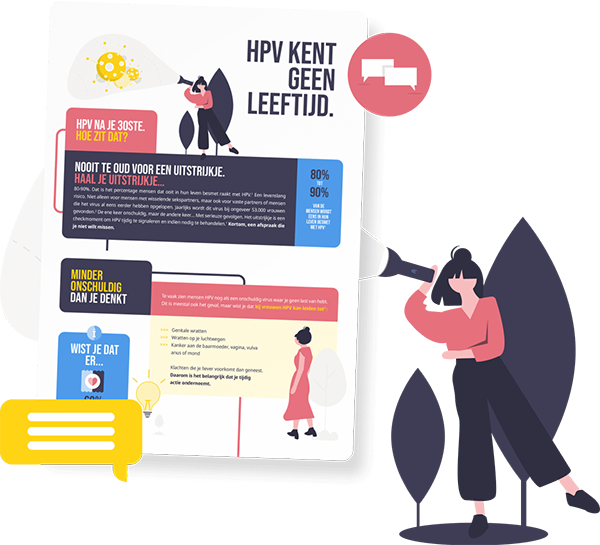You can protect yourself against HPV in three ways: by getting vaccinated, even at a later age, by using a condom during sex and by taking part in cervical cancer screening1
Do you first want to know what is HPV? Read more here.

HPV is common in the Netherlands. Because of this, boys and girls turning 10 years old receive an invitation for a free HPV-vaccination as part of the National Immunization Program. In 2023, this opportunity is extended to everyone up to the age of 26. If you are older than 26, vaccination is available outside of the program at your own expense.1,2
Everyone has a lifelong risk of contracting HPV. The risk of infection increases i.a. with multiple sexual partners, but you can also get infected from a permanent partner. Even if you have had HPV before, there is a chance of getting infected with the same or a different HPV type. 3-5 Vaccination at a later age, when you are sexually active or have had HPV before, can still be beneficial. It is unlikely that you have encountered all HPV types before. Vaccination can protect you against new infections with the other HPV-types the vaccines target.4
You need a prescription to get vaccinated against HPV outside of the National Immunization Program. You can contact your general practitioner (GP), the Public Health Service (GGD), a vaccination center or a private clinic. At your GP, you will have to purchase the vaccine first at a pharmacy and then return to your GP to get the shot administered. At the GGD, a vaccination center, or a private clinic they will likely have the vaccine readily available. Do you want more information or want to get in touch with a professional? You can visit the ‘Let’s talk about HPV’ page.
The cost of one HPV shot starts from 120 euros.* Depending on your health status, you may require 2-3 doses.6
*Excluding delivery and administration fees (depending on the provider).
There are many different types of HPV. Some of them cause certain types of cancer and others genital warts. In the Netherlands there are two vaccines available. The HPV-vaccines protect against the specific HPV types they target. Both vaccines provide protection at the very least against anal, cervical, vaginal, and vulvar cancer. They are around 90% effective against the HPV types they target.1
Like any medication, a vaccine can also have side effects, although not everyone experiences them. You may experience pain, itching, redness, or swelling at the injection site. You can also have symptoms such as headache, fever, dizziness, fatigue, or nausea. These side effects are usually mild and go away on their own.6
Both boys and girls who turn 10 years old receive an invitation for a free vaccination in the National Immunization Program. Since 2022, the Health Council advises vaccinating boys as well because they can also get and transmit HPV.
You will receive an invitation by mail to get the vaccination for your child. The free vaccine in the National Immunization Program consists of two shots, given six-months apart. Depending on your region, the vaccinations are administered at the Public Health Service (GGD) or at a Youth and Family Center.2
You can. Anyone can get vaccinated outside the program at their own expense.
The risk of HPV infection increases i.a. with multiple sexual contacts, but also a permanent partner can give you HPV.3-5
Men cannot undergo standard testing for HPV, but women can. Women aged 30 to 60 are invited every 5 to 10 years to participate in a population-based cervical cancer screening program. Via this program, a precancerous stage of cervical cancer can be detected early through a smear- or self-test. In most cases early detection allows for effective treatment of precancerous stages of cervical cancer.7
You’ll receive an invitation for the screening by post. The smear test is done at the general practitioner’s office, usually by the doctor’s assistant. The procedure takes around 10 minutes.7
You can still do a self- or a smear test at your own initiative.

Your guide to HPV, HPV-related diseases, and options for protection. All in one convenient overview.
Using a condom during sex reduces the risk of an HPV infection, but it doesn’t protect you fully. The virus is highly contagious and can be transmitted through contact with the skin around the genital area of someone carrying the virus. You can also contract genital warts by using the same towel as someone with an HPV infection.1,8

1. RIVM, HPV , accessed aug 2023
2. RIVM, Rijksvaccinatieprogramma HPV, accessed aug 2023
3. Gezondheidsraad, Vaccinatie tegen HPV, accessed jun 2019
4. LCI, Richtlijn HPV vaccinatie, accessed aug 2023
5. KFW, HPV: wat is het virus, accessed aug 2023
6. Farmacotherapeutisch Kompas, HPV, accessed aug 2023
7. Bevolkingsonderzoek Nederland, Bevolkingsonderzoek Baarmoederhalskanker, accessed aug 2023
8. RIVM, Genitale wratten, accessed aug 2023
Visit the FAQ page and find answers to your HPV-related questions